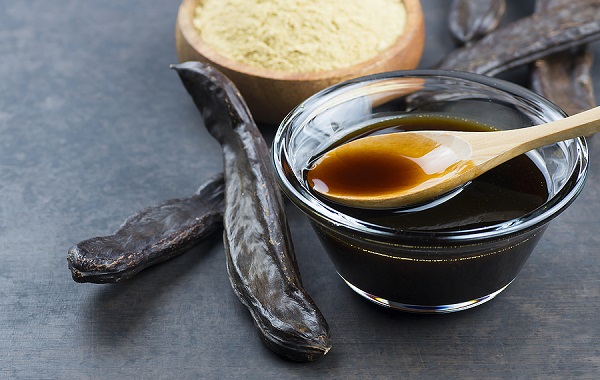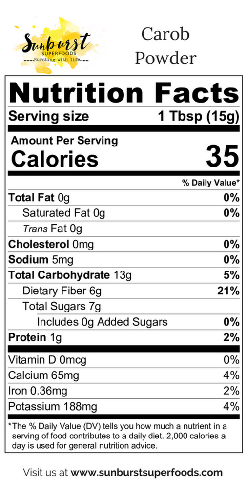- Home
- Food Questions
- Carob
Is Carob Ok on The Candida Diet?
Posted 12/27/2020
Written by Dan Jackowiak Nc, HHP
The carob scientific name is Ceratonia siliqua, it is a tree that has fruit on it. It looks like a dark brown pea pod and contains pulp and seeds. It is considered the best substitute for chocolate. In ancient Greece, 4000 years ago it was used for its health benefits.
In the 19th century,
British chemists sold the pods to singers for the betterment of
their vocal cords. Carob was also called Saint John’s bread,
because it was believed that the locusts on which John the Baptist
fed were actually carob pods.

Studies suggest that Carob was used by the people of ancient Egypt and Greece and it was a source of food for those people. This plant survived the last ice age and flourished throughout the Mediterranean region. It is thought that this plant adapted to poor soils and harsh climates extremely well. During the times of famine in the Mediterranean region, it was a primary source of food.
Previous studies reported that the Spaniards brought carob to South America and Mexico, and the British carried carob to India, Australia, and South Africa. Carob powder was also synthesized and transported to Portugal.
Nutrient Profile of Carob
Carbs:
Carob
contains 5g of carbohydrates. Sugar in carob is 3g and fiber is 1g.
Proteins:
Carob pods consist of 4.54%–4.60% protein, and in most products made of carob, the percentage of proteins ranges from 0.43 to 5.12%. (Source)
Fats:
According to studies, carob contains 0g of fat or no fat. However, some studies show that carob powder contains 3.5g of fat.
Vitamins and Minerals:
Vitamin A: It protects the eyes and prevents night blindness. It also boosts the immune system and improves bone health.
Vitamin B2: B2 is useful for the breakdown of proteins, carbs, and fats in the body. Breakdown and conversion of macromolecules help in the production of ATP.
Vitamin B3: Helps increase high density lipoprotein (HDL) and lowers low density lipoprotein (LDL). It improves brain function, heart health, and helps in the treatment of type-2 diabetes.
Vitamin B6: B6 reduces the risk of Alzheimer’s disease and improves the function of the brain. It reduces the symptoms of depression.
Copper: This mineral is responsible for the maintenance of good heart health.
Calcium: This mineral is helpful for improved bone health. It improves the function of the muscles and nerves.
Manganese: Manganese is responsible for development, growth, and metabolic reactions.
Potassium: Potassium plays an essential role in regulating fluid balance, nerve signals, and muscle contractions.
Magnesium: This mineral is effective against diabetes, improves cardiovascular health, and boosts immunity.
Zinc: Helps with wound healing, enhanced immunity, and improved metabolism function.
Selenium: Selenium acts as an antioxidant. It improves thyroid functioning, mental health, and reduces the risk of certain cancers.
Health Benefits of Carob
Improves the digestive system:
Sugars present in the carob helps thicken the stool. Studies suggest that carob bean juice is safe and effective when used to treat diarrhea.
Lowers the LDL:
Carob
helps in the reduction of LDL and improves the HDL in the body and
prevents the risk of heart disease.
Provides antioxidants and nutrients:
It contains phenolic acids, gallic acid, and tannins which are all antioxidants.
Improves blood sugar levels:
Carob contains inositols such as d-inositol and p-inositol. These molecules help to combat insulin resistance and diabetes. In one study, it showed that carob lowers the blood sugar levels after a meal. (Source)
Negative Health Effects of Carob
Carob allergies were reported in one study but they are rare. According to the study, carob may cause rashes, hay fever, and asthma.
More consumption of carob is not recommended in the pregnant females because it may cause extremely low blood sugar levels and weight loss.
Carob & The Candida Diet
The following nutrition information is provided by the USDA for 100g – basically 1 cup - of 100% natural carob powder.
- Calories: 340
- Fat: 0g
- Sodium: 0mg
- Carbohydrates: 70g
- Fiber: 0g
- Sugars: 0g
- Protein: 10g
A cup of Carob powder however contains 49g of sugar and 88g of carbs overall.

Obviously, if we look at a label from a Carob Powder product on the right using only 1 tbsp the carb amount is 13g. 6g of that is fiber which would bind 6g of sugar leaving 1 gram net. There are also syrups, cookies, bars, etc on the market made from carob. Carbs and added sugars vary from one product to the next.
Compared to milk chocolate carob has more carbs per serving. However, the makers of most milk chocolate products always add sugar so you end up with too much of that.
If you are wondering about carob as a replacement for chocolate, you are better off with unsweetened dark chocolate. Checking the label of Hershey's dark cocoa, 1 tbsp shows 3g of carbs and 0g sugar, perfect! Other products can often contain added sugars which drives up the carb amounts.
Bottom line, check the label. If the carb load is under 10g with no added sugars then an occasional chocolate treat is going to be ok. Not very filling but quite often fulfills an emotional need.
Back to Candida Diet Questions
Any questions about carob and the candida diet or about yeast infections in general, please feel free to contact us from the contact page of this website or talk to your doctor.
Home Privacy Policy Copyright Policy Disclosure Policy Doctors Store
Copyright © 2003 - 2025. All Rights Reserved under USC Title 17. Do not copy
content from the pages of this website without our expressed written consent.
To do so is Plagiarism, Not Fair Use, is Illegal, and a violation of the
The Digital Millennium Copyright Act of 1998.